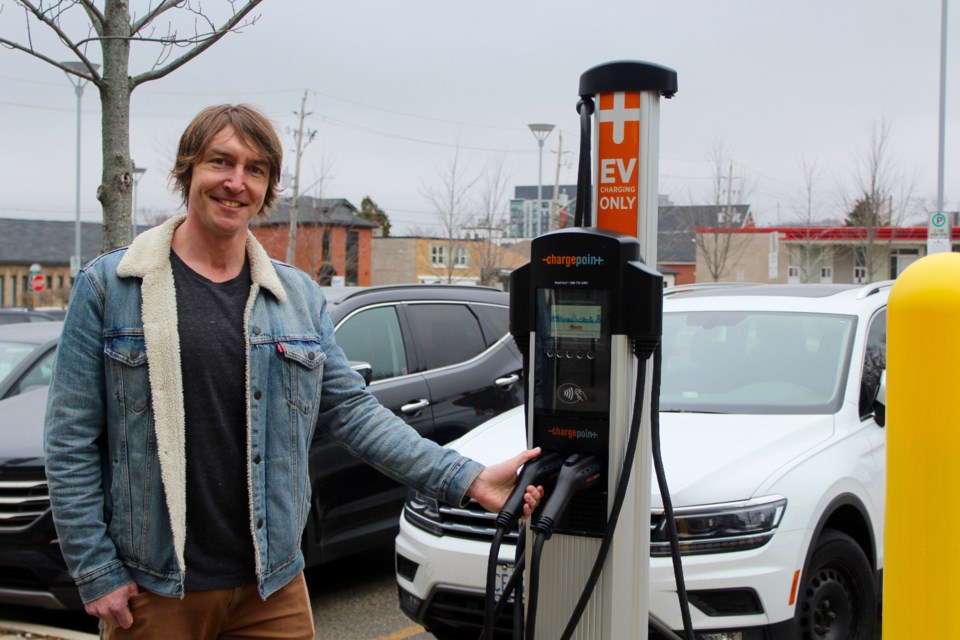Scott Hamilton wants to get ahead of the game when it comes to the future of transportation.
With draft federal regulations requiring that 100 per cent of all new passenger vehicles and light trucks sold in Canada after 2035 be electric zero-emission, the Ward 7 councillor will present a motion to council next week regarding charging stations.
The motion, if passed, will direct staff to examine the possibility of mandating all new developments, retail locations and city parking lots to possess a certain number of electric charging stations. These requirements would then increase along with the federal mandate.
One of the reasons Hamilton wanted to bring the motion forward was a personal experience navigating the electric vehicle market.
“I wanted to move this because recently one of my cars died,” Hamilton said.
“It was a gas guzzler and we wanted to get an electric car for the environmental benefits and cost savings. It turned out it was out of our price range and I didn’t see a lot of charging infrastructure.”
Cost may not be a concern for long as an electric battery plant is slated to open in Windsor in 2024. Without the need to outsource and ship the batteries, the price of such vehicles is likely to fall, Hamilton says.
Add in the fact the city is expected to grow by 70,000 residents in the next 30 years, Hamilton feels the time to start planning is now.
“I look at Cambridge and question whether we have the infrastructure to support it,” he said.
“There are some charging stations in the city, but for the amount we’ll need there’s not enough. It’s cheaper for the city as a whole, and more practical and efficient, to get it all set up now.”
Some may feel electric vehicles are still a thing of the future, but scaling up the number on the road will begin in 2026 until the goal of 100 per cent of new vehicles is reached.
Hamilton points to the swift evolution of smartphones and laptops as an example of how quickly new ways of doing things can overtake the market.
“A lot of people think electric cars are way off in the future, but think about smartphones and laptops,” he said.
“Those things at one time were expensive and rare. Within five or 10 years, everyone had one.”
Boosting government incentive programs is one way EV purchases could shift into high gear.
The feds currently offer a $5,000 rebate for eligible vehicle purchases, but that could change as Canada moves closer to its mandate to phase in zero-emission electric vehicles.
The Liberal government's phased approach to reach its 2035 goal is only three years away with the requirement that 20 per cent of all vehicles sold in Canada be electric beginning in 2026.
Critics have pointed to the current supply crunch and a lack of charging infrastructure; something the motion addresses.
If Hamilton's motion passes, residents shouldn’t expect new charging stations to pop up around the city over night. Rather it will inform future planning and development.
Hamilton acknowledges with any new change there will be resistance.
The current cost, environmental impact of sourcing the lithium for the batteries and questionable mining practices are all issues that arise when it comes to the manufacturing of electric vehicles.
They’re all questions that will need to be answered and ironed out along the way, but the time is coming.
According to the Canada Energy Regulator and Government of Canada website, 86,032 electric vehicles were registered in 2021 compared to 56,165 in 2019.
A total of 34,313 new zero-emission vehicles were registered in the third quarter of 2022, or 8.7 per cent of all new vehicle registrations. Of those, 11,017 were registered in Ontario according to Statistics Canada.
It’s a matter of environmental responsibility and preparation, Hamilton says.
“Electric vehicles are much cleaner and cheaper to operate overall,” he said.
“Look at the new builds that are already in the process, including subdivisions in Ward 7. I don’t want us to build them and then in a few years think we should've put in the infrastructure necessary a year or two too late.”

.png;w=120;h=80;mode=crop)

